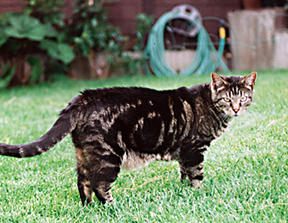
Although fresh air, sunshine and the opportunity to explore yards and gardens may seem like a good lifestyle for a cat, multiple dangers lurk in the great outdoors, from cars and canines to poison, predators and parasites. All in all, cat experts agree that keeping a cat indoors is definitely the best way to keep them safe and healthy.
Theres no doubt about it, indoor cats tend to be healthier and to live longer – often twice as long, in fact, as outdoor cats, says Christine Bellezza, DVM, a consultant with the Cornell Feline Health Center at Cornell Universitys College of Veterinary Medicine. Thats because indoor cats cant get hit by cars, shot or poisoned by neighbors, attacked by other animals, and arent exposed to as many diseases as outdoor cats, such as feline leukemia, feline immunodeficiency virus, feline infectious peritonitis, rabies and distemper. Indoor cats also are protected from being exposed to all kinds of other killers, such as pesticides and antifreeze, and cant get lost.
Nevertheless, some cat lovers allow their cats to go outdoors, not wanting to deprive their felines of the stimuli that the outdoors can provide. If thats the case, then be sure to take precautions to minimize the health risks and dangers, says Dr. Bellezza.
Here is a list of steps cat lovers can take to protect their beloved furry pet:
Spay or neuter. Neutered males are much less likely to get into cat fights, which can lead to serious injuries and infections as well as exposure to feline leukemia virus, feline immunodeficiency virus and other contagious infections. Spayed females cant get pregnant and add to the overpopulation problem.
Vaccinate. All cats need certain vaccinations, such as those for rabies, panleukopenia, and respiratory tract viruses, but since outdoor cats are exposed to other cats, they may need additional vaccinations, such as those for feline leukemia virus. Talk to your veterinarian about which vaccines your outdoor cat should receive, Dr. Bellezza advises.
Protect against ticks, fleas and worms. There are new kinds of tick and flea control measures that veterinarians can prescribe that are far more effective than the old flea collars and flea sprays that pet owners used for years, says Dr. Bellezza.
Do not declaw. Outdoor cats are less able to protect themselves if they dont have claws. Never let a declawed cat outdoors.
Consider using a fence. The best way to keep an outdoor cat safe is to contain her in a fenced area, says Dr. Bellezza. Many fences for dogs, such as free-standing pens, can be adapted for cats by adding a top, she says. Various cat-suitable fences and pens are available at pet specialty stores.
Consider using a harness and leash. If introduced gradually, cats can get used to being walked on a cat leash using a body harness.
Consider time of day. Dawn, dusk and dark are particularly dangerous times for cats to be outdoors because predators tend to hunt in these darker hours and drivers cant spot animals as easily as during the daytime.
Be mindful of chemicals. Make sure theres no antifreeze on your garage floor (cats love to lick this sweet, but deadly stuff), no freshly sprayed herbicides on your lawn, no rat poisons or other chemicals in your yard, garden, garage or shed. Follow manufacturers instructions for any chemicals you might use to protect lawns and gardens and keep your cat inside for the days or weeks the chemical may endure.
Garden with care. Cats may nibble on flowers and leaves of ornamental plants, some of which can be irritating or deadly. If your cat has access to your garden, choose only cat-safe plants. Easter lilies, fox glove and Japanese yew, for example, are toxic to cats.
Provide an escape route. Make sure your cat has access to a cat door, barn or other shelter to which your cat can flee if frightened by predators.
Avoid extreme weather. Make sure your cat can come in or has a shelter during storms and extreme heat and cold.
ID your cat. To prevent your cat from getting lost, make sure that he wears a safety collar with your name and phone number. Better yet, talk to your veterinarian about implanting a microchip into your cat.
Put a bell on your cat. This doesnt protect the cat, but it may help protect the thousands of songbirds that are killed each year by cats.
If you dont use an escape-proof area, your cat is vulnerable to some perils you cant protect against, such as vehicles, dog and cat attacks, cat nappers or people intent on harming them.



